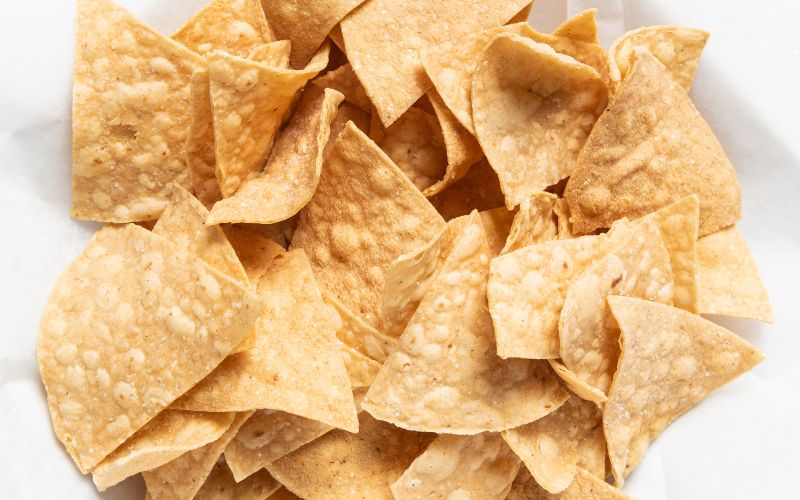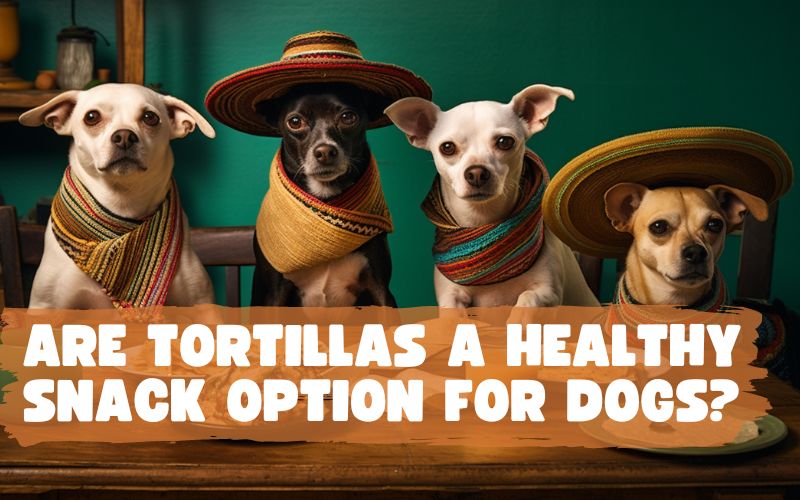Would that leftover tortilla from your dinner be a tasty treat for your beloved dogs? Your dogs can eat Tortillas.
It’s generally safe for dogs to consume tortillas, although certain factors such as the type of tortilla and its preparation method should be taken into account. Notably, one fact to consider: although not toxic, tortillas hold minimum nutritional value for dogs.
This comprehensive article aims to deeply demystify the dog-tortilla debate, offering guidance rooted in scientific research and expert opinion. Let’s unravel this canine culinary conundrum together!
Key Takeaways
- Tortillas offer little to no nutritional value for dogs and can contribute to weight gain due to their high carbohydrate content.
- Flour tortillas, especially those made with lard or shortening, should be given in moderation due to their high fat and calorie content. They can also trigger allergies or sensitivities in dogs predisposed to grain or gluten intolerance.
- Corn tortillas are generally lower in carbohydrates, calories, and fat than flour tortillas but still provide minimal nutritional benefits for dogs. They should also be given in moderation, as some dogs may have cereal sensitivities or allergies.
- It’s essential to consult with a veterinarian before introducing any new food into your dog’s diet and prioritize their overall health and well-being over sharing human snacks like tortilla chips.
What is Tortillas?
Tortillas, a staple in Latin American dishes like tacos and enchiladas, come in two primary types: corn and flour. Corn tortillas originate from dried corn kernels treated with an alkaline process called nixtamalization.

This method uses calcium hydroxide or industrial-grade lime to break down the hard shell of the kernel, later ground into masa harina (dough flour) for making authentic tortillas. The result is a whole-grain product rich in fiber and magnesium but contains less sodium than their flour counterparts.
On the other hand, flour tortillas are made from wheat flour mixed with fat sources such as lard or shortening—this contributes to their higher calorie content than corn variants.
While they offer some protein and iron levels due to wheat’s nutritional profile, it’s essential to note that they can also trigger sensitivities or allergies among dogs predisposed to grain or gluten intolerance.
In contrast with homemade versions free of preservatives and chemicals, processed Tortillas may contain additional ingredients, including amylases, xylanases, transglutaminases, oxidoreductase, proteases, salt emulsifiers, gums—all harmful for your furry friends when ingested regularly.
These substances often serve as fillers without contributing any significant nutrients beneficial for dogs’ health needs; moreover might indicate pancreas disorders if they show symptoms post-meal consumption making veterinary consultation pivotal.

Can Dogs Eat Tortillas Safely?
Dogs can eat tortillas safely, but some considerations depend on the type of tortilla and how it is prepared.
Flour Tortillas
Flour tortillas, as an occasional treat, won’t hurt your dog. However, they should not form a regular part of your canine’s diet due to their high fat and calorie content. These popular wraps are made with lard or shortening – ingredients that can quickly add unhealthy weight to your pet if consumed in excess.
One of the primary concerns about feeding flour tortillas to dogs is the potential for allergic reactions or cereal sensitivities. Dogs have varying tolerance levels for human food like wheat products, so monitoring any changes in behavior or physical health after they consume these treats is essential.
Ensure you’re aware of symptoms indicating gluten intolerance or wheat allergies, such as digestive problems, skin irritations, and lethargy.
The safety factor increases if you switch from processed flour tortillas to homemade ones. Homemade versions tend not to include harmful preservatives and chemicals often found in commercially manufactured counterparts.
But remember- even homemade treats need moderation! Keep calories under control and ensure balanced nutrition for optimal dog health.
Corn Tortillas
Corn tortillas are a staple in many homes, especially those that enjoy Latin American dishes. They have a different nutritional profile compared to flour tortillas and may seem like an appealing treat for your dog.
Made chiefly from corn kernels through a process known as nixtamalization and sometimes fortified with the likes of calcium hydroxide, these rounds can be tempting nibbles for our canine companions.
Yet, despite their popularity among humans, corn tortillas offer little to no nutritional benefits for dogs. Dogs thrive on diets rich in protein rather than carbohydrates, and the high carb content of these products doesn’t align with what is most beneficial for them nutritionally.
Consuming too many carbs can lead to weight issues in dogs, including obesity; it can also potentially contribute to diabetes if fed excessively over time.
Moreover, while unlikely to be toxic or harmful if consumed occasionally or in small quantities by dogs without grain sensitivities, one should take heed that certain dogs suffer from cereal sensitivities resulting from their unique digestive system’s abilities when processing grains.
These food allergies could result in gastrointestinal inflammation, causing discomfort or even distress. Hence caution is advised when feeding your fur babies any grain-based treats such as corn tortillas.
Homemade Tortillas
Homemade tortillas, made from corn or flour, can be a tempting treat for your furry friend. However, it’s essential to consider a few factors before sharing these tasty morsels with your dog.
While homemade tortillas are generally safer than processed options, they should still be given in moderation. Dogs have different nutritional needs than humans, and tortillas offer them little to no nutritional value.
They are high in carbohydrates and don’t provide essential vitamins and minerals that dogs require. Additionally, if you’re making flour tortillas at home using lard or shortening, they will contain more fat and calories compared to corn tortillas.
It’s always best to consult your veterinarian before introducing new food into your dog’s diet to ensure its health and well-being.
When preparing homemade treats for your pup, it’s crucial to prioritize their dietary needs rather than indulge their every craving. Both human-produced flours can affect digestion in dogs differently.
In contrast, grains like wheat do not sit well with all dogs’ stomachs due in part because of the gluten content found within them—tortilla consumption by puppies or adult dogs should be closely monitored for possible complications such as allergies or sensitivities during initial trials as reactions may occur after repeated exposures even when initially absent.
Tortilla Chips
Tortilla chips are a popular snack for humans, but can dogs eat tortilla chips? Unfortunately, avoiding giving your furry friend these crispy treats is best. Tortilla chips often contain high levels of salt and unhealthy fats, which can harm dogs.
Excessive salt intake can lead to dehydration and other severe health conditions in dogs. Additionally, the high-fat content in tortilla chips can contribute to weight gain and even obesity in our four-legged companions.
Moreover, some commercially available tortilla chips may also contain added preservatives, chemicals, or artificial flavors unsuitable for canine consumption. You must prioritize your dog’s health by feeding them a balanced diet that meets their nutritional needs without unnecessary additives or empty calories.
If you’re looking for alternative snacks for your pup, plenty of healthier options are available. Homemade treats made specifically with dog-friendly ingredients like lean meats or fruits and vegetables provide better nutrition while still satisfying their cravings.
Always consult your veterinarian about any dietary concerns or restrictions before introducing new foods into your dog’s diet.
Are Tortillas Good for Dogs?
Tortillas are not considered good for dogs as they offer no nutritional benefits and can contribute to weight gain due to their high carbohydrate content.
Nutritional Analysis
Tortillas, made from corn or flour, offer no nutritional benefits for dogs and are high in carbohydrates. Processed tortillas, including tortilla chips, lack nutrition and may contain toxic ingredients.
Flour tortillas contain more fat and calories than corn tortillas. Corn tortillas are considered whole grains and are generally lower in carbs, calories, and fat than flour tortillas.
Feeding dogs tortilla chips is not recommended as it can cause dehydration and other severe conditions. Homemade tortillas are safer for dogs as they don’t contain preservatives, chemicals, or unhealthy ingredients found in processed tortillas.
Feeding tortillas to dogs in excess can lead to obesity, diabetes, heart disease, upset stomach, vomiting, diarrhea, allergies unwanted eating habits. Puppies should not be fed Tortillas as they are still growing & don’t need food that may contribute to future health problems.
Dogs may have allergic reactions or cereal sensitivities to Tortillas as they do not process grains like humans. It’s essential to be cautious of the Ingredients inside wraps or taco shells before feeding them to dogs, certain spices & condiments may be unsuitable. The Dog owner must consult a Vet before adding any particular diet routine into their pet’s life.
Potential Health Risks
Feeding your dog tortillas can pose potential health risks to their overall well-being. While tortillas may be a staple in some households, they offer little to no nutritional benefits for dogs and are high in carbohydrates.
Overconsumption of tortillas can lead to rapid weight gain, putting your furry friend at risk for obesity, diabetes, and heart disease.
It’s important to note that processed tortillas, including popular options like tortilla chips, often lack proper nutrition and may contain toxic ingredients such as preservatives and emulsifiers.
These additives can harm dogs’ digestive systems and contribute to gastrointestinal inflammation. Additionally, the high salt content in processed tortillas can cause dehydration and other severe conditions if consumed regularly.
When choosing between flour or corn tortillas for your dog, it’s essential to consider their health needs. Flour tortillas generally contain more fat and calories than corn ones, making them less ideal for dogs on a calorie-restricted diet or those prone to weight gain.
On the other hand, corn tortillas tend to be lower in carbs, calories, and fat compared to flour tortillas. Each dog is unique, with different dietary restrictions and sensitivities. Some dogs may have allergies or cereal sensitivities that make digesting grains challenging.
Monitoring how your dog reacts after consuming any grain-based product, like a tortilla, is crucial. To minimize potential health risks associated with feeding your dog tortillas, opt for homemade tortillas made without preservatives or unhealthy ingredients.
What to Do If Your Dog Eats Tortillas
If your dog accidentally consumes tortillas, taking the necessary steps to ensure their health and well-being is essential. Firstly, stay calm and assess the situation. If your dog has only eaten a small amount of tortilla, there is likely no cause for immediate concern.
However, if they have consumed a large quantity or show signs of distress, you must contact your veterinarian for guidance.
In some cases, dogs may experience digestive issues after eating tortillas. Watch for symptoms such as vomiting, diarrhea, or excessive thirst. Monitor your dog closely and ensure it can always access fresh water.
Additionally, consider temporarily adjusting their diet by offering easily digestible meals like boiled chicken and rice until any potential discomfort subsides.
Prevention is vital to keeping your dog safe from potentially harmful foods. Store tortillas securely away from your pet’s reach and dispose of any leftovers properly so they can’t be tempted to indulge in an unsuitable snack again.
Taking prompt action and being mindful of what foods are safe for dogs can help ensure your furry friend stays healthy and happy in the long run.
Different Types of Tortillas and Their Effects on Dogs
Different types of tortillas can have varying effects on dogs. Fresh tortillas made with simple, natural ingredients are generally safer for dogs than processed tortillas that may contain preservatives, chemicals, and unhealthy ingredients.
Flavored tortillas, such as spinach or multigrain varieties, should be cautiously approached as they could cause digestive issues or allergic reactions in some dogs. Veterinary consultation is recommended before introducing any new type of tortilla into a dog’s diet.
Fresh Tortillas
Fresh tortillas can be a tempting treat for dogs, but it’s essential to understand the potential effects on their health. While fresh tortillas are generally safer than processed ones, they still offer little nutritional value for our furry friends.
Fresh flour tortillas, often made with lard or shortening, contain more fat and calories than corn tortillas. These high-fat content treats can contribute to rapid weight gain in dogs if consumed regularly.
On the other hand, fresh corn tortillas are considered whole grains and tend to be lower in carbs, calories, and fat than their flour counterparts. However, smaller dogs may face a choking hazard from corn kernels in these tortillas.
Additionally, some dogs may have allergic reactions or cereal sensitivities since their digestive systems don’t process grains like humans.
While feeding your dog an occasional piece of fresh tortilla is unlikely to cause harm, it’s essential to remember that it should not become a regular part of their diet due to the lack of nutritional benefits.
Flavored Tortillas
Flavored tortillas, such as tortilla chips, can be tempting to share with your furry friend during Taco Tuesday or movie nights. However, it’s important to exercise caution when offering these snacks to your dog.
Flavored tortillas often contain onions or garlic, which are toxic for dogs and can cause serious health issues. These ingredients damage a dog’s red blood cells, leading to anemia and other complications. Therefore, it’s best to avoid giving your dog flavored tortillas altogether.
Instead of flavored varieties, opt for plain corn or wheat-free tortillas if you’re looking for a safe alternative. Plain corn tortillas made from corn flour are generally safe for dogs as they do not contain any harmful additives and can be easily digested by their sensitive stomachs.
Additionally, many commercial dog foods already include corn flour as a gluten-free ingredient that provides essential nutrients for your pup’s diet.
Spinach Tortillas
Spinach tortillas can be a tempting treat for dogs, but it’s essential to give them in moderation. While spinach is safe for dogs and provides necessary vitamins and minerals, overconsumption of spinach tortillas can lead to weight gain and blood sugar problems.
Dogs don’t require a high carbohydrate diet like humans do, so limiting their intake of these tasty wraps is best. However, if you want to give your dog a taste of the Latin American dish, consider homemade tortillas with safe fillings like beef, chicken, or even more spinach!
Always keep portions small and ensure that the tortillas are free from added ingredients like garlic or onion that can be toxic to dogs.
Multigrain Tortillas
Multigrain tortillas are a popular choice for people looking for a healthier option. These tortillas are made with a combination of different grains like wheat, oats, and barley, providing additional fiber and nutrients.
While they may seem like a nutritious choice for dogs, it’s important to consider their specific dietary needs.
Dogs have different digestive systems than humans and may not process grains as efficiently. Some dogs can develop sensitivities or allergies to certain grains, including wheat, commonly found in multigrain tortillas.
If your dog has a history of grain-related issues or sensitive stomachs, it’s best to avoid feeding them multigrain tortillas.
Additionally, multigrain tortillas often contain added ingredients such as preservatives or emulsifiers that may not suit your furry friend’s health. It’s always wise to consult your veterinarian before introducing new food into your dog’s diet.
They can guide the appropriate choices based on your dog’s nutritional requirements while maintaining their overall well-being.
FAQs about Dogs and Tortillas
Can dogs eat tortillas?
While dogs can technically eat tortillas, it is not recommended as a regular diet. Tortillas, made with corn or flour, are high in carbohydrates and offer little to no nutritional benefits for dogs.
They lack essential vitamins and minerals that dogs need to thrive. Additionally, processed tortillas like tortilla chips are even less suitable for dogs as they often contain added salt, unhealthy oils, and potentially toxic ingredients.
Are homemade tortillas better for dogs?
Homemade tortillas can be a safer option for dogs compared to store-bought ones. When making homemade tortillas, you have more control over the ingredients used. This means avoiding artificial additives, preservatives, and other potentially harmful substances in processed versions.
However, it’s still important to keep in mind that even homemade tortillas should be given sparingly as an occasional treat rather than a staple food.
Can eating too many tortilla chips harm my dog?
Feeding your dog excessive amounts of tortilla chips can indeed be harmful. Tortilla chips are typically fried and loaded with salt, which can lead to dehydration and other severe health conditions in dogs.
Additionally, the high-fat content in these snacks can contribute to weight gain and obesity if consumed regularly. It’s always best to choose healthier treats designed for canine consumption rather than sharing human snacks with your furry friend.
Always consult your veterinarian before introducing new foods into your dog’s diet or if you suspect any adverse reactions after feeding them certain foods like tortillas or related products such as taco shells or wraps.
Conclusion
While dogs can technically eat tortillas in moderation, they offer no nutritional benefits and can pose several health risks. It’s essential to be mindful of the type of tortilla given to dogs and to avoid processed options like tortilla chips.
Homemade tortillas made with safe ingredients may be a safer choice. However, it is always best to consult a veterinarian before introducing new food into your dog’s diet.
Always keep in mind, their health should always come first!
